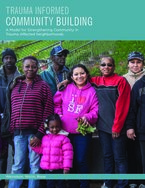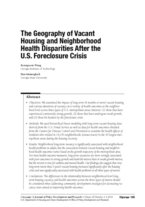0
Research
Community:
Aug 5, 2019
CLPHA developed a general data sharing template that public housing authorities (PHAs) and their health partners can customize to suit their data sharing and collaboration needs. Please feel free to comment to share any uses/modifications your organization made to implement into a partnership.
Authored by:
Topics: Affordable Care Act, CLPHA, Community development, Cost effectiveness, Data sharing, Dental, Depression, Dual-eligibles, Funding, Health, Healthy homes, Legislation & Policy, Low-income, Medicaid / Medicare, Mental health, Metrics, MTW, Nutrition, Obesity, Partnerships, Place-based, Preventative care, Racial inequalities, Research, SAMHSA, Smoke-free, Stability, Substance abuse, Supportive housing, Sustainability, TA
 Shared by Steve Lucas
Shared by Steve Lucas
Steve Lucas posted a
on Aug 5, 2019
Disclaimer: This template is provided for informational purposes only and not for the purpose of providing legal advice. You should contact your attorney to obtain advice with respect to any particular issue or question. Use of this template, including its exhibits and attachments, does not create a relationship or any responsibilities between CLPHA and the user.
CLPHA developed a general data sharing template that public housing authorities (PHAs) and their health partners can customize to suit their data sharing and collaboration needs. Please feel free to comment to share any uses/modifications your organization made to implement into a partnership.
0
News Article
Community:
Jan 10, 2019
Island School is one of 247 “community schools” in New York. These are regular public schools, with a twist. They have longer days and longer school years: Island stays open 12 hours a day, six days a week, including spring and winter breaks as well as the summer. A psychologist makes weekly rounds. A dentist comes by regularly. So does an optometrist, and students who need glasses get them free.
Authored by: David L. Kirk for The New York Times
Topics: Community development, Dual-generation, East Coast, Education, Family engagement, Homelessness, Housing, Low-income, Mental health, Metrics, Partnerships, Stability, Youth
 Shared by Mica O'Brien
Shared by Mica O'Brien
Mica O'Brien posted a
on Jan 10, 2019
David L. Kirk for The New York Times
Island School is one of 247 “community schools” in New York. These are regular public schools, with a twist. They have longer days and longer school years: Island stays open 12 hours a day, six days a week, including spring and winter breaks as well as the summer.
0
Research
Community:
Dec 5, 2018
How does the quality of where we live affect our children’s development? The impact of housing and neighborhood quality on physical health has long been studied in the public health field, but studies that aim to assess those same impacts on mental health are less common. This study examined the relationship between the physical quality of housing and neighborhoods and their interactive effect on the mental health and motivation of children from elementary school through young adulthood.
Authored by: Journal of Environmental Psychology
Topics: Child welfare, Community development, Housing, Low-income, Mental health, Racial inequalities, Research, Youth
 Shared by Mica O'Brien
Shared by Mica O'Brien
Mica O'Brien posted a
on Dec 6, 2018
Journal of Environmental Psychology
How does the quality of where we live affect our children’s development? The impact of housing and neighborhood quality on physical health has long been studied in the public health field, but studies that aim to assess those same impacts on mental health are less common.
0
Report
Community:
Oct 24, 2018
CLPHA’s Housing Is Initiative is engaged in a number of cross-sector activities focused on developing partnerships, facilitating a community of practice, resource development, promoting best practices, online collaboration, policy and advocacy, and training and education. Read about recent activities in this Fall Update.
Authored by:
Topics: Child welfare, CLPHA, Community development, Cost effectiveness, Data sharing, Early childhood, Education, Family engagement, Funding, Health, Homelessness, Housing, Low-income, Medicaid / Medicare, Mental health, Partnerships, Place-based, Post-secondary, Research, Stability, Substance abuse, Workforce development, Youth
 Shared by Mica O'Brien
Shared by Mica O'Brien
Mica O'Brien posted a
on Oct 24, 2018
CLPHA’s Housing Is Initiative is engaged in a number of cross-sector activities focused on developing partnerships, facilitating a community of practice, resource development, promoting best practices, online collaboration, policy and advocacy, and training and education.
0
Publication
Community:
Aug 9, 2018
Trauma is a set of normal human responses to stressful and threatening experiences (National Center for PTSD, 2007). Low-income and public housing residents may experience cumulative trauma resulting from daily stressors of violence and concentrated poverty, as well as historic and structural conditions of racism and disenfranchisement. We present a model of Trauma Informed Community Building (TICB) that addresses the challenges trauma poses to traditional community building strategies. TICB strategies de-escalate chaos and stress, build social cohesion and foster community resiliency over time.
Authored by:
Topics: Community development, Housing, Low-income, Mental health, Racial inequalities
 Shared by Housing Is
Shared by Housing Is
Housing Is posted a
on Aug 9, 2018
Trauma is a set of normal human responses to stressful and threatening experiences (National Center for PTSD, 2007).
1
Research
Community:
Aug 1, 2018
We examined the impact of long-term (6 months or more) vacant housing and various durations of vacancy on a variety of health outcomes at the neighborhood level across three types of U.S. metropolitan areas (metros): (1) those that have experienced consistently strong growth, (2) those that have undergone weak growth, and (3) those hit hardest by the foreclosure crisis
Authored by:
Topics: Asset building, Asthma, Community development, Health, Housing, Low-income, Mental health, Metrics, Research, Safety, Transportation
 Shared by Housing Is
Shared by Housing Is
Housing Is posted a
on Aug 1, 2018
We examined the impact of long-term (6 months or more) vacant housing and various durations of vacancy on a variety of health outcomes at the neighborhood level across three types of U.S.
0
Policy Brief
Community:
Jul 17, 2018
The Denver Social Impact Bond program is an initiative aimed at measurably improving the lives of people most in need by driving resources towards better, more effective programs. Social Impact Bonds are a unique type of performance-based contract where private and/or philanthropic lenders loan funds to accomplish a specific objective and are repaid based on whether the program achieves its goals. Denver’s Social Impact Bond program will use funds from lenders to provide housing and supportive case management services to at least 250 homeless individuals who frequently use the city’s emergency services, including police, jail, the courts and emergency rooms.
Authored by:
Topics: Community development, Cost effectiveness, Criminal justice, Health, Homelessness, Housing, Low-income, Mental health, Partnerships, Stability, Substance abuse, West Coast
 Shared by Housing Is
Shared by Housing Is
Housing Is posted a
on Jul 17, 2018
The Denver Social Impact Bond program is an initiative aimed at measurably improving the lives of people most in need by driving resources towards better, more effective programs.
0
Case study
Community:
Jul 17, 2018
The South Lincoln Health Impact Assessment (HIA) focuses on the redevelopment master plan for the Denver Housing Authority’s South Lincoln Homes community in downtown Denver. The rapid HIA and masterplan was a four-month process that began in April 2009. The HIA identifies potential health impacts and recommends changes to optimize positive and minimize negative health consequences for the South Lincoln neighborhood. This assessment includes community demographic and socioeconomic information, identified potential health issues, interviews available surveys, and limited body measurement data along with supportive evidence-based research and recommendations that informed the HIA and masterplan design.
Authored by:
Topics: Child welfare, Community development, Disabilities, Dual-generation, Health, Housing, Low-income, Mental health, Metrics, Nutrition, Preventative care, Research, Safety
 Shared by Housing Is
Shared by Housing Is
Housing Is posted a
on Jul 17, 2018
The South Lincoln Health Impact Assessment (HIA) focuses on the redevelopment master plan for the Denver Housing Authority’s South Lincoln Homes community in downtown Denver. The rapid HIA and masterplan was a four-month process that began in April 2009.
0
Case study
Community:
Jul 12, 2018
The Trauma Informed Community Building (TICB) model is based on BRIDGE Housing Corporation’s experience doing community building work over the past five years in the Potrero Terrace and Annex public housing sites in San Francisco, CA.
Authored by:
Topics: Child welfare, Community development, Dual-generation, Family engagement, Low-income, Mental health, Partnerships, Place-based, Preventative care, Research, Safety
 Shared by Housing Is
Shared by Housing Is
Housing Is posted a
on Jul 12, 2018
The Trauma Informed Community Building (TICB) model is based on BRIDGE Housing Corporation’s experience doing community building work over the past five years in the Potrero Terrace and Annex public housing sites in San Francisco, CA.
1
News Article
Community:
Jul 3, 2018
Researchers have shown — and teachers know — that schoolchildren exposed to neighborhood violence can have a tougher time learning, experiencing more stress and depression than their peers growing up in safe neighborhoods. But a Johns Hopkins University sociologist discovered that the consequences of neighborhood violence reach further than previously known, even spilling over to students who come from safe neighborhoods. Using crime and student data from Chicago, Julia Burdick-Will linked exposure to neighborhood violence to a drop in test scores, an effect that extended to students coming from communities that experienced little or no violence.
Authored by: Moriah Balingit for The Washington Post
Topics: Attendance, Child welfare, Community development, Depression, Education, Health, Low-income, Mental health, Midwest, Out-of-school time, Post-secondary, Racial inequalities, Research, Youth
 Shared by Mica O'Brien
Shared by Mica O'Brien
Mica O'Brien posted a
on Jul 3, 2018
Moriah Balingit for The Washington Post
Researchers have shown — and teachers know — that schoolchildren exposed to neighborhood violence can have a tougher time learning, experiencing more stress and depression than their peers growing up in safe neighborhoods.
1
Video
Community:
May 23, 2018
The Council of Large Public Housing Authorities (CLPHA) hosted The Housing Is Summit in Washington, D.C., on May 3-4, 2018 with 300 partners across the housing, education, and healthcare sectors. Access video recordings of the Summit's keynote speakers (HUD Secretary Ben Carson, John Bridgeland, Matthew Morton), plenary panels (on topics that cut across sectors like anchor institutions, data collaboration, stability, and foundation investments), and select breakout sessions focused on the intersections of housing, education, and health.
Authored by: Council of Large Public Housing Authorities
Topics: Affordable Care Act, Attendance, Child welfare, CLPHA, Community development, Data sharing, Dual-eligibles, Dual-generation, Early childhood, Education, Funding, Grade-level proficiency, Health, Healthy homes, Homelessness, Housing, Legislation & Policy, Low-income, Medicaid / Medicare, Mental health, Metrics, MTW, Out-of-school time, Partnerships, Place-based, Preventative care, Racial inequalities, Research, School-readiness, Seniors, Stability, Substance abuse, Supportive housing, Sustainability, TA, Workforce development, Youth
 Shared by Steve Lucas
Shared by Steve Lucas
Steve Lucas posted a
on May 23, 2018
The Council of Large Public Housing Authorities (CLPHA) hosted The Housing Is Summit in Washington, D.C., on May 3-4, 2018 with 200 partners across the housing, education, and healthcare sectors. The Summit highlighted the ways that we can transform systems to better serve low-income people with two days of plenary speakers/panels, breakout sessions, and caucus discussions geared toward intersectional thinking and ways to take action.
Council of Large Public Housing Authorities
The Council of Large Public Housing Authorities (CLPHA) hosted The Housing Is Summit in Washington, D.C., on May 3-4, 2018 with 300 partners across the housing, education, and healthcare sectors.













